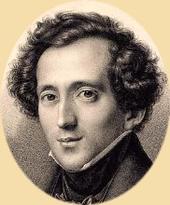Myspace Layouts by Pimp-My-Profile.com
Born February 3, 1809 in Hamburg, Germany, Felix Mendelssohn began as a child prodigy. His father, Abraham Mendelssohn, was a successful banker; his influential mother, Leah Solomon, was an amateur musician. Felix studied both the violin and piano and gave his first public recital at age nine. Encouraged by his family and teachers, the precocious Felix began writing music when he was 10 years old. At the age of 17, he astonished the world with a true masterpiece, his Overture to William Shakespeare's A Midsummer Night's Dream. By this time he had already written his twelve symphonies for string orchestra.As a conductor, Mendelssohn was very busy both in his native Germany and in England, where Queen Victoria and Prince Albert adored him. He had a deep respect for musical tradition and for the past, and was largely responsible for the mid-19th century revival of interest in J.S. Bach's music. In 1829, at the age of 20, Mendelssohn conducted the first performance of the St. Matthew Passion since Bach's death nearly eighty years before.
In 1841 he was named director of the Music Section of the Academy of Arts in Berlin, which required him not only to supervise and conduct a wide variety of programs but also to compose upon royal demand of King Frederick of Prussia. The incidental music which complements his dazzling 1826 Overture to A Midsummer Night's Dream was sparked by one of Frederick's requests.
Mendelssohn toured, guest conducted and composed incessantly, and participated in endless rounds of social engagements and chamber music soirées. On March 28, 1837 he took on the additional responsibilities of family life when he married Charlotte Jeanrenaud.
Mendelssohn won a short hiatus from his accumulating duties when he took a leave of absence from his post at the Gewandhaus during the 1844-45 season. Before his sabbatical began, however, Mendelssohn had to fulfill a commitment to conduct the London Philharmonic Society Orchestra in a series of concerts during the late spring of 1844. This English engagement created the same spectacular success that was to follow each of his other eight visits to that country.
Mendelssohn's elder sister Fanny was also a talented composer and pianist. Her work was not publicly performed, however, because a musical career was not thought proper for women then. There had always been a close bond between the two siblings, and when Fanny died in May 1847, Felix fell into a deep depression. Already exhausted and ill, he never recovered from Fanny's death. His own death followed a few months later.
Sinfonien :
12 Streichersinfonien, 1821–1823
Sinfonie Nr. 1 c-Moll op. 11 (1824)
Sinfonie Nr. 2 B-Dur (Sinfoniekantate „Lobgesang“) op. 52 (1840)
Sinfonie Nr. 3 a-Moll („Schottische“) op. 56 (1842)
Sinfonie Nr. 4 A-Dur („Italienische“) op. 90 (1833)
Sinfonie Nr. 5 d-Moll („Reformationssinfonie“) op. 107 (1832)
Instrumentalkonzerte:
Violinkonzert d-Moll (1822)
Violinkonzert e-Moll op. 64 (1838/1844)
Klavierkonzert a-Moll (1822)
Klavierkonzert Nr. 1 op. 25 (1831)
Klavierkonzert Nr. 2 op. 40 (1837)
2 Doppelkonzerte für 2 Klaviere (E-Dur und As-Dur) (1823 und 1824)
Doppelkonzert für Violine, Klavier und Orchester (1823)
Ouvertüren:
Ouvertüre für Harmoniemusik op. 24 (1824)
Ouvertüre C-Dur (Trompetenouvertüre) [op. 101] (1825)
Ein Sommernachtstraum op. 21, (1826/1831)
Das Märchen von der schönen Melusine op. 32 (1833)
Die Hebriden op. 26 (1832)
Meeresstille und glückliche Fahrt op. 27 (1828/1833/1834)
Ruy Blas [op. 95] (1839)
Schauspielmusik:
Antigone op. 55 (1841)
Ein Sommernachtstraum op. 61 (1843) (darin der bekannte Hochzeitsmarsch)
Athalia (Jean Racine) [op. 74] (1843–1845)
Oedipus in Kolonos [op. 93] (1845)
Lorelei [op. 98] (1845)
Oratorien:
Paulus op. 36 (1835)
Elias op. 70 (1846)
Erde, Hölle und Himmel (Christus) [op. 97] (unvollendet)
Opern und Singspiele:
Die beiden Neffen oder der Onkel aus Boston
Die Hochzeit des Camacho
Soldatenliebschaft
Die beiden Pädagogen Die wandernden Komödianten
Die Heimkehr aus der Fremde (Liederspiel op. 89, 1829)
Kammermusik:
7 Streichquartette: Es-Dur (1823), op. 13 (1827), op. 12 (1829), op. 44 No. 1–3 (1837/1838) und op. 80 (1847)
Oktett op. 20, 1825
Instrumentalsonaten für Violine (op. 4 1823, F-Dur, 1838), Viola (1823/24) und Violoncello (op. 45, 1838 und op. 58, 1842/43)
Klaviertrios:
d-Moll op.49, c-Moll op.66
3 Klavierquartette: c-Moll (1822) op. 1, f-Moll (1823) op. 2, h-Moll (1825) op. 3
Klaviermusik:
Charakterstücke op. 7 (1827)
Präludien und Fugen
Variationen
3 Sonaten ([op. 105], 1820/21, op. 6, 1825 und [op. 106], 1827)
Etüden
Capriccios
Lieder ohne Worte, acht Sammlungen, darin „Jägerlied“ op. 19 Nr. 3, „Frühlingslied“ op. 62 Nr. 6 und „Spinnerlied“ op. 67 Nr. 4
Orgelmusik:
Präludium d-moll (1820)
Andante D-dur (1823)
Passacaglia c-moll (1823)
Drei Präludien und Fugen op. 37 (1836/37)
Drei Fugen (1839)
Präludium c-moll (1841)
Sechs Sonaten op. 65 (1844/45)
Andante con variazioni D-dur (1844)
Allegro B-dur (1844)
Lieder und weltliche Chormusik:
Auf Flügeln des Gesanges
Gruß (Leise zieht durch mein Gemüt)
Abschied vom Wald (O Täler weit, o Höhen)
Motetten:
Herr, nun lässest du deinen Diener op. 69 Nr. 1 (Text: Lukas 2, 29–32 und Doxologie)
Drei Psalmen: Psalm 2 [op. 78 Nr. 1] (Erstfassung von 1843 mit Orgel), Richte mich, Gott [op. 78 Nr. 2] (Text: Psalm 43, 1–5), Psalm 22 [op. 78 Nr. 3]
Kantaten:
Christe, Du Lamm Gottes (1827)
O Haupt voll Blut und Wunden (1830)
Vom Himmel hoch (1831)
Wir glauben all (1831)
Ach Gott vom Himmel sieh darein (1832)
Die erste Walpurgisnacht op. 60
